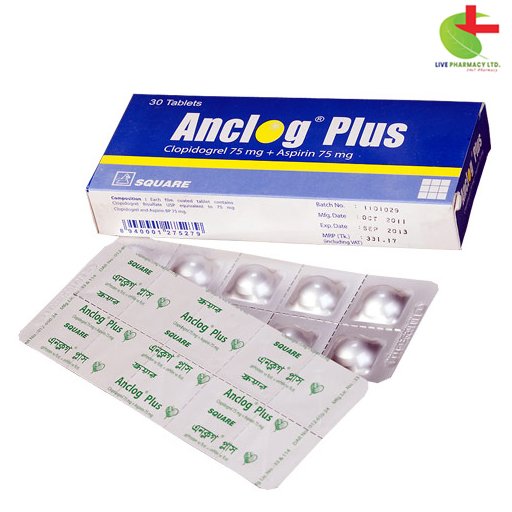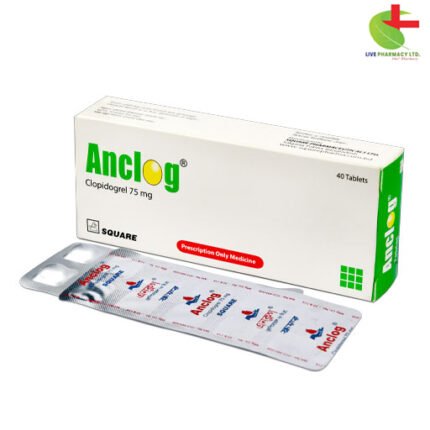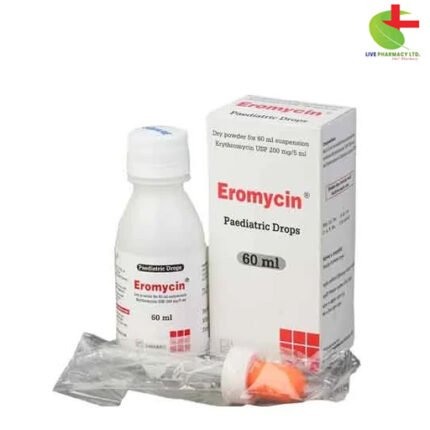Anclog Plus
120.30৳ Strip
- Addressing cardiovascular health concerns with precision and care
- Tailored medication options for Acute Coronary Syndrome (ACS) and recent cardiovascular events
- Featuring Clopidogrel, a powerful antiplatelet medication, and Aspirin for comprehensive protection
- Clear dosing instructions and expert guidance for optimal treatment outcomes
 Brand
Brand
|
Square Pharmaceuticals PLC |
|---|---|
 Generics
Generics
|
Clopidogrel + Aspirin |
Indications
Addressing Acute Coronary Syndrome (ACS): Our medication is prescribed to lower the risk of Myocardial Infarction (MI) and Stroke among patients experiencing non-ST-segment elevation ACS (including unstable angina [UA]/non-ST-elevation Myocardial Infarction [NSTEMI]) and acute ST-segment elevation ACS (ST-elevation Myocardial Infarction [STEMI]).
Managing Recent Cardiovascular Events: For individuals with a recent MI, recent Stroke, or established Peripheral Arterial Disease, our medication is recommended to diminish the likelihood of further heart attacks and strokes.
Pharmacology
Clopidogrel Mechanism: Clopidogrel operates as a prodrug, exerting its effects by inhibiting platelet activation and aggregation. This occurs through irreversible binding of its active metabolite to the P2Y12 class of ADP receptors on platelets. The inhibition of platelet aggregation is dose-dependent, with observable effects within 2 hours of a single oral dose.
Aspirin Function: Aspirin functions by irreversibly inhibiting platelet cyclooxygenase, thereby impeding the generation of thromboxane A2, a potent inducer of platelet aggregation and vasoconstriction.
Pharmacokinetics
Absorption and Metabolism: Following oral administration of repeated 75-mg doses of Clopidogrel, rapid absorption occurs, with peak plasma levels of the main circulating metabolite reached approximately 1 hour post-dosing. Clopidogrel undergoes extensive hepatic metabolism, primarily yielding the carboxylic acid derivative, which represents the predominant circulating compound.
Dosage & Administration
Recommended Dosage: The standard dose of Clopidogrel is 75 mg once daily, with or without food. For patients with acute coronary syndrome, an initial loading dose of 300 mg is advised, followed by a maintenance dose of 75 mg once daily. Aspirin is typically co-administered with Clopidogrel, with dosages ranging from 75 mg to 325 mg once daily.
Interactions
Drug Interaction Insights: Aspirin does not impact the Clopidogrel-mediated inhibition of ADP-induced platelet aggregation, while Clopidogrel enhances aspirin’s effect on collagen-induced platelet aggregation. Co-administration with heparin does not require modification of heparin dosage or alter its effect on coagulation.
Contraindications
Medical Contraindications: This combination therapy is contraindicated in cases of hypersensitivity to the drug substance or any of its components, as well as in instances of active pathological bleeding such as peptic ulcer or intracranial hemorrhage.
Side Effects
Tolerability: Our medication is generally well tolerated, with reported side effects being rare.
Pregnancy & Lactation
Safety Considerations: Limited data exist regarding the use of Clopidogrel in pregnant women, necessitating cautious use during the first and second trimesters and avoidance during the third trimester. Breastfeeding mothers should discontinue medication use due to the potential excretion of aspirin in breast milk.
Precautions & Warnings
Risk Factors: Anclog Plus may prolong bleeding time and has been associated with rare occurrences of thrombotic thrombocytopenic purpura (TTP) and Reye’s syndrome. Caution is advised in patients with a history of hypersensitivity reactions.
Special Populations
Pediatric Use: Anclog Plus is not recommended for children under 12 years of age unless the potential benefits outweigh the risks, particularly considering aspirin’s association with Reye’s syndrome.
Overdose Effects
Management of Overdose: Clopidogrel overdose may lead to bleeding complications, necessitating appropriate management such as platelet transfusion. Aspirin overdose symptoms may include dizziness, headache, and gastrointestinal discomfort, with treatment involving supportive measures.
Therapeutic Class
Categorization: Our medication belongs to the therapeutic class of anti-platelet drugs, specifically designed to mitigate platelet aggregation.
Storage Conditions
Optimal Storage: Store our medication in a cool, dry place below 30°C, shielded from light and moisture, and out of reach of children.













Reviews
There are no reviews yet.